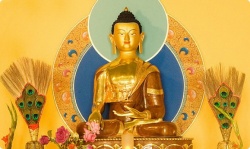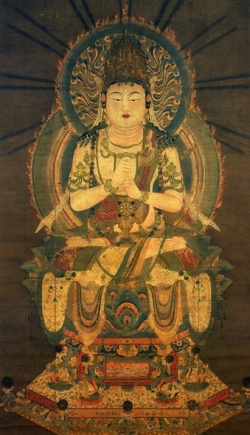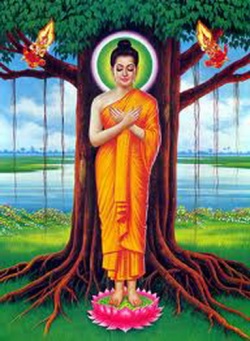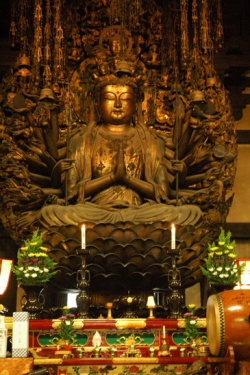Anuttara Samyak Sambodhi
Immediately following his Awakening experience Zen master Te Shan burnt all of his commentaries and books on Zen that he had carried with him everywhere he went.
Some time ago I was given a handful of old dog-eared, worn copies of Zen books that were found in a box that had been stored away and misplaced in my younger brother's attic for many years...books that I at onetime had carried around with me everyplace I went just like Te Shan did.
One of the books in that handful was a 1960s copy of "The Diamond Sutra and the Sutra of Hui Neng,." Hui Neng was the Sixth Patriarch of C'han or Zen Buddhism and one of the foremost figures in the Zen tradition --- so, of course, in those early days of learning about Zen I HAD to "know" about him.
In a footnote to Section II of the Diamond Sutra there is a reference to ANUTTARA SAMYAK SAMBODHI and it's meaning, which the authors A. F. Price and Wong Mou-Lam translated, refering to the Awakening experience of Siddhartha Gautama, the Buddha under the Bodhi Tree, simply as the: Consummantion of Incomparable Enlightenment. For all the years that followed that was always good enough for me and what I used for AWAKENING 101 initially. As time passed and the participant level grew into the hundreds and hundreds and the questions continued to come, it became apparent a clearer translation was required --- so the following translation was gleaned, as credited on the link at the bottom of the page, from "The Collected Works of Shinran":
The dharma that the Buddha realized is called anuttara-samyak-sambodhi. He is called Buddha because he has realized this bodhi.
An means "un," uttara means "excelled," samyak means "right," sam means "all-pervading," and bodhi is translated "way." Taken together, the term is translated "unexcelled, right, all-pervading way."
"Unexcelled" means that this way thoroughly penetrates true reality and reaches the ultimate nature of things; nothing surpasses it. Why? Because it is perfect.
"Right" refers to Enlightened wisdom. Because it knows things just as they are, it is called "right wisdom." Because dharma-nature is formless, Enlightened wisdom is no-knowing.
"All-pervading" has two meanings:
The Enlightened mind knows all things everywhere;
The dharma-body universally fills the dharma-realm. Neither the body nor the mind ever fails to be present everywhere.
"Way" refers to "unhindered way." The Garland Sutra states, "Those unhindered throughout the ten quarters have gone beyond birth-and-death upon the one way." "One way" is the one unhindered Enlightenment. "Unhindered" means to know that birth-and-death is itself Nirvana. Such Dharma-gates as this one teaching entrance into non-duality reveal the unhinderedness of Enlightenment.
ANUTTARA SAMYAK SAMBODHI
TRANSLATION:
There is nothing (an) more supremely high (uttara) than unities fullfillment (sam samma']) of Being (yakkha, could also say Essence, or "soul" in loose sense) in the oneness (San. [samma, or Sva]) of exquisite perfection(sam, in combination with Bodhi is always a modifier of excellence) in great wisdom (Dhi)
Anuttara (adj.) [an + uttara) "nothing higher", without a superior, incomparable, second to none, unsurpassed, preeminent Sn 234 (= adhikassa kassaci abh?vato KhA 193), 1003; Dh 23, 55 (= asadisa appa?ibh?ga DhA I.423); Pv IV.35 2(dhamma); Dhs 1294; DA I.129; PvA 1, 5, 6, 18, etc.
Tara [see tarati] (n.) crossing, "transit," passing over Sn 1119 (maccu°). -- (adj.) to be crossed, passable, in duttara hard to cross S IV.157; Sn 174, 273 (ogha? t. duttara?); Th 2, 10; It 57. Also as su--duttara S I. 35; V.24.
Unities (Eng., n., pl.) [1] state of being one; oneness. [2] a whole or totality as combining all its parts into one. [3] the state or fact of being united or combined into one, as the parts of a whole; unification.
SAMYAK(sanskrit) Pali (SAMMA').. YAK (hyphenated Yakkha)= SAN.+YAKKHA
SAN.(ALWAYS MEANING ONE WITH, UNITY, HOLY CONJUNCTION WITH (usually bodhi, buddhahood), YAKKHA=(THE SPIRIT, SOUL, pali ATTA', sanskrit Atman, combined with San. always meaning the one supreme Unity of Buddhahood, perfection, (Tathagatahood, Buddhahood, i.e. the Tathattaman, Buddhatta', Nibbana (skt. Nirvana).
Yakkha [[[Wikipedia:Vedic|Vedic]] yak?a, quick ray of light, but also "ghost"; fr. yaks to move quickly; perhaps: swift creatures, changing their< abode quickly and at will. -- The customary (popular) etym. of Pali Commentators is y. as qua?si grd. of yaj, to sacrifice, thus: a being to whom a sacrifice (of expiation or propitiation) is given. See e. g. VvA 224: yajanti tattha bali? upaharant? ti yakkh?; or VvA 333: p?jan?ya--bhavato yakkho ti vuccati. -- The term yak?a as attendants of Kubera occurs already in the Upanishads.] 1.7. Exceptionally the term "yakkha" is used as a philosophical term denoting the "individual soul" [cp. similar Vedic meaning< "das lebendige Ding" (B.R.) at several AV. passages]; hence probably the old phrase: ett?vat? yakkhassa suddhi (purification of heart) Sn 478, quoted VvA 333 (ett?vat'agga? no vadanti h'eke yakkhassa sudhi? idha pa?d?it?se). Sn 875 Nd1 282: yakkha=satta, nara, puggala, manussa).
SAMBOHDI =SAMMA'(hyphenated to sam, as is frequently the case)+BODHI (var. BUDDH,i.e. perfect DHI(WISDOM)), BODHI(unexcelled wisdom, perfect Enlightenment, Buddha posesses SUPREME BODHI, Arhats have perfection of Bodhi , varient of Buddh', the perfection of DHI(supreme wisdom).....Samma'(same as above, explicative, from San.=to be one with, Unities Fullfullment, Sankrit SVA(ones one in pefection, i.e. Buddhahood,) also Pali SA (samma') (ones own in pregnent pefect sense)
Bodhi (f.) [fr. budh, cp. Vedic bodhin--manas having an Enlightened mind's essence; RV V.75, 5; VIII.82, 18] (supreme) knowledge, Enlightenment, the knowledge possessed by a Buddha (see also sambodhi & samm?--sambodhi) M I.356; II.95=D III.237
Sambodha; [sa?+bodha] Enlightenment, highest wisdom, Awakening; the insight belonging to the three higher stages of the Path, Vin I.10; D III.130 sq., 136 sq.; S II.223; V.214; M I.16, 241; A I.258; II.200, 240 sq., 325 sq.; V.238 sq.; It 27; pubbe sambodh?, before attaining insight M I.17, 163; II.211; III.157; S II.5, 10; IV.6, 8, 97, 233; V.281; A I.258; III.82, 240. abhabba sambodh?ya, incapable of insight M I.200, 241=A II 200. (Cp. Dial. I.190--192.) -g?min leading to Enlightenment D III.264; Sn p. 140. --pakkhika belonging to Enlightenment A IV.357. --sukha the bliss of Enlightenment A IV.341 sq.
ANUTTARA SAMYAK SAMBODHI
translation:
There is nothing (an) more supremely high (uttara) than unities fullfillment (sam [samma']) of Being(yakkha, could also say Essence, or "soul" in loose sense) in the oneness (San. [samma, or Sva]) of exquisite perfection (sam, in combination with Bodhi is always a modifier of excellence) in great wisdom.



